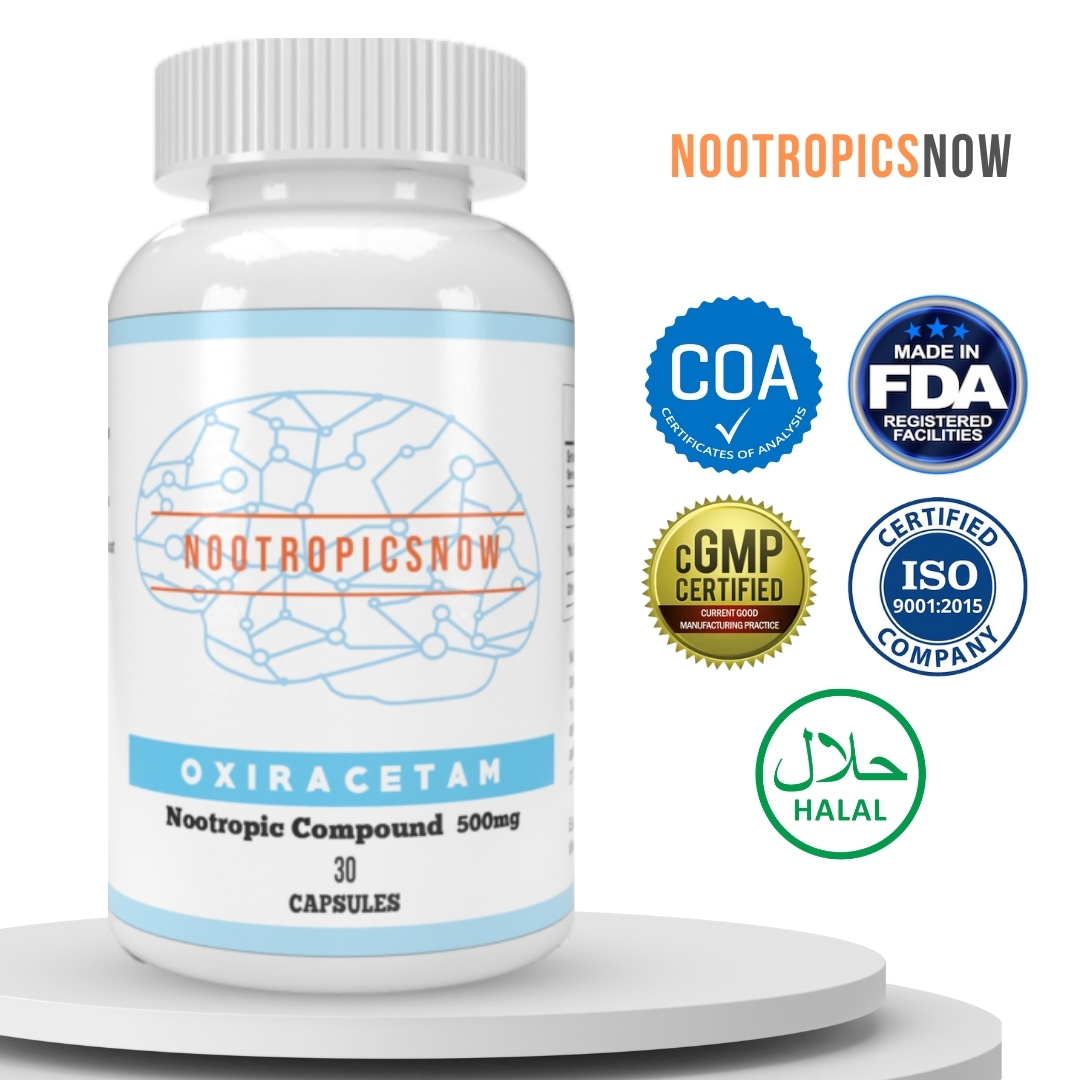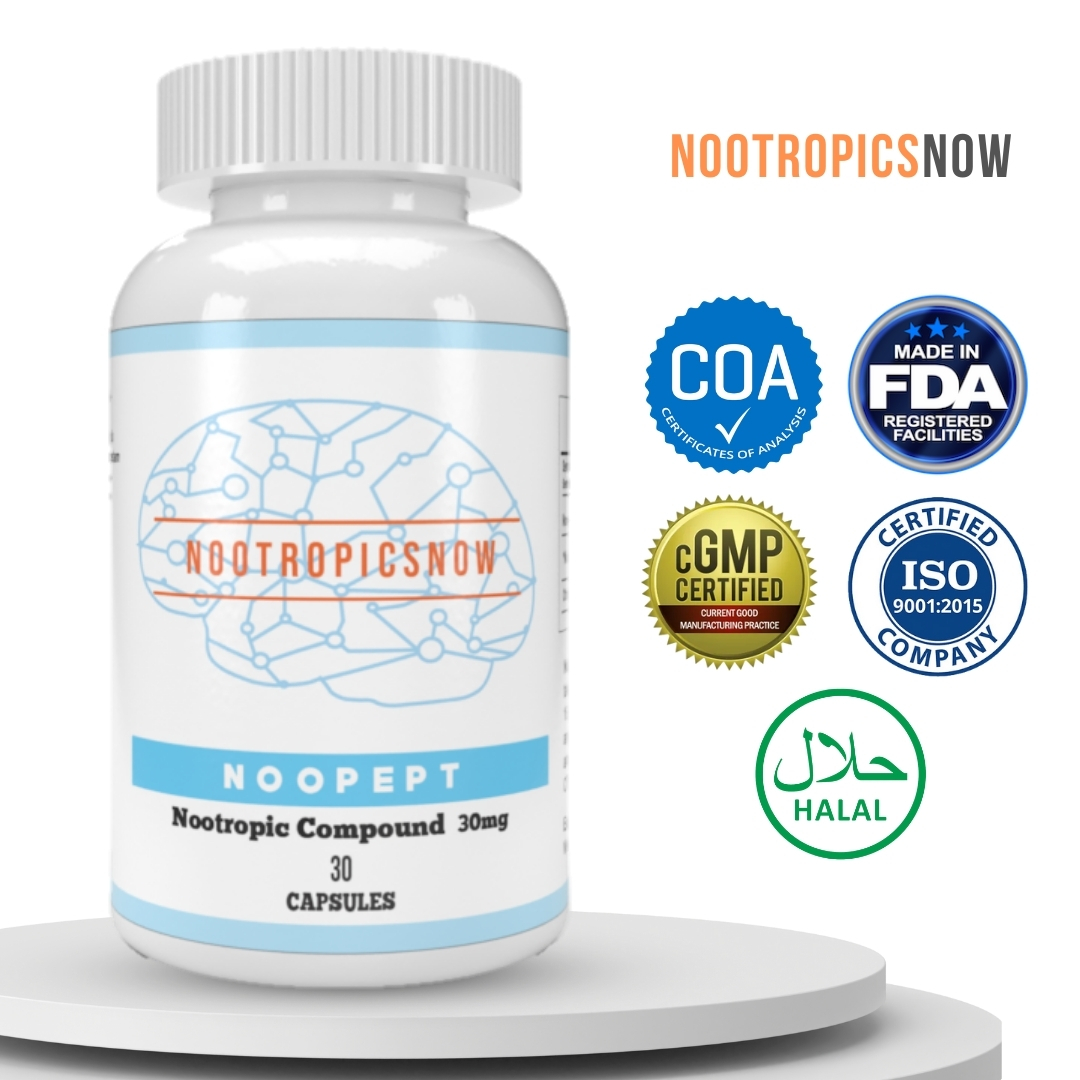Phenylpiracetam Effects: Benefits & Side Effects

Phenylpiracetam Effects: A Comprehensive Overview
Phenylpiracetam, also known as Phenotropil, is a synthetic nootropic compound that has garnered attention for its potential cognitive-enhancing and physical performance-boosting effects. Derived from piracetam, a well-known nootropic, phenylpiracetam distinguishes itself through the addition of a phenyl group. This structural modification allows it to cross the blood-brain barrier more effectively. Subsequently, this alteration leads to a higher bioavailability and a potentially more potent effect compared to its parent compound. Due to these properties, individuals seek phenylpiracetam to improve focus, memory, and physical endurance.
Understanding Phenylpiracetam
Phenylpiracetam was initially developed in Russia in the 1980s. The aim was to assist cosmonauts in coping with the prolonged stress of space travel. It is valued for its stimulant properties without the typical side effects associated with traditional stimulants. Therefore, its ability to enhance cognitive function and physical performance has made it popular among students, athletes, and professionals alike.
Chemical Structure and Mechanism

Phenylpiracetam’s chemical structure is (RS)-2-(4-phenyl-2-oxopyrrolidin-1-yl)acetamide. This structure facilitates its rapid absorption and distribution in the body. It also allows phenylpiracetam to interact with various neurotransmitter systems within the brain. The precise mechanism of action is not fully understood. However, it is believed to influence the levels and activity of neurotransmitters such as dopamine, norepinephrine, and acetylcholine.
Legality and Availability
The legal status of phenylpiracetam varies across different countries. In some regions, it is available as a prescription medication, while in others, it can be purchased as a research chemical or dietary supplement. Therefore, before purchasing or using phenylpiracetam, individuals should verify its legal status in their respective locations.
Cognitive Effects of Phenylpiracetam
One of the primary reasons people use phenylpiracetam is its potential to enhance cognitive function. These cognitive benefits are reported across a range of mental processes. Phenylpiracetam helps users improve focus, memory, and learning ability.
Enhanced Focus and Concentration
Many users report improved concentration and focus after taking phenylpiracetam. This effect may be particularly beneficial for individuals who struggle with attention deficits. Consequently, these users can perform tasks requiring sustained mental effort more effectively. The heightened focus appears to stem from phenylpiracetam’s influence on dopamine and acetylcholine neurotransmission. These neurotransmitters are essential for maintaining attention and cognitive control.

View Product
Improved Memory and Learning
Phenylpiracetam is also believed to enhance memory and learning capabilities. It is thought to facilitate the consolidation of new information. Further, it is believed to improve recall of existing memories. By increasing the efficiency of neuronal communication, phenylpiracetam may promote the formation of stronger neural connections. Therefore, learning is made easier and memory recall is enhanced.

View Product
Increased Cognitive Clarity
Some users of phenylpiracetam describe experiencing improved cognitive clarity. This involves a sense of mental sharpness, reduced brain fog, and an enhanced ability to think clearly. This can be particularly useful for tasks that require complex problem-solving. In addition, it helps with decision-making. Cognitive clarity can increase productivity and overall cognitive performance.
Physical Effects of Phenylpiracetam
In addition to its cognitive effects, phenylpiracetam is also known for its potential physical benefits. The enhancement of physical stamina and resistance to stress makes it a popular supplement.
Increased Physical Endurance
Phenylpiracetam has been reported to increase physical endurance and reduce fatigue. This effect can be valuable for athletes and individuals involved in strenuous physical activities. By potentially improving the body’s ability to withstand physical stress, phenylpiracetam can help individuals push themselves harder and for longer periods of time. This is achieved without experiencing exhaustion.

View Product
Enhanced Stress Resistance
Phenylpiracetam is considered an adaptogen. This means it may help the body adapt to stress and maintain homeostasis. By modulating the body’s stress response, phenylpiracetam may help reduce the negative effects of stress on both physical and mental health. Moreover, this allows individuals to maintain peak performance under challenging conditions.

View Product
Improved Motor Skills
Some studies suggest that phenylpiracetam may enhance motor skills and coordination. This effect could be beneficial for athletes, surgeons, and anyone requiring precise physical movements. Further, this improvement in motor skills may arise from phenylpiracetam’s influence on neurotransmitter systems involved in motor control.
Potential Side Effects and Risks
While phenylpiracetam is generally considered safe, it is essential to be aware of potential side effects and risks. These side effects can vary depending on the individual, dosage, and other factors.
Common Side Effects
Some of the most commonly reported side effects of phenylpiracetam include:
Tolerance and Withdrawal
With regular use, tolerance to the effects of phenylpiracetam can develop. This means that higher doses are needed to achieve the same effects. It’s possible to mitigate tolerance by cycling the use of the drug. Also, withdrawal symptoms, such as fatigue, depression, and cognitive impairment, may occur if phenylpiracetam is abruptly discontinued.
Contraindications
Phenylpiracetam may not be suitable for everyone. Specific individuals should avoid it:
Interactions with Other Medications
Phenylpiracetam may interact with certain medications, potentially altering their effects or increasing the risk of side effects. Potential interactions should be considered, including:
Dosage and Administration
Finding the right dosage of phenylpiracetam is crucial for maximizing its benefits while minimizing the risk of side effects. The optimal dosage can vary depending on individual factors such as body weight, sensitivity, and desired effects. It is generally recommended to start with a low dose and gradually increase it as needed.
Recommended Dosage Range
A typical dosage range for phenylpiracetam is between 100 mg and 300 mg per day. The dose is usually split into two or three administrations. Some users may find that lower doses are effective, while others may require slightly higher doses. However, it is generally not recommended to exceed 600 mg per day.
Timing
Phenylpiracetam is typically taken in the morning or early afternoon due to its stimulant properties. Taking it late in the day may interfere with sleep. Some individuals prefer to take it on an empty stomach for faster absorption. However, others may find that taking it with food helps to reduce gastrointestinal side effects.
Cycling
To prevent tolerance and maintain the effectiveness of phenylpiracetam, it is recommended to cycle its use. Cycling involves taking phenylpiracetam for a certain period of time. It is followed by a break before resuming use. A common cycling schedule is to use phenylpiracetam for two to four weeks, followed by a one- to two-week break.
User Experiences and Anecdotes
User experiences with phenylpiracetam can vary widely, as individual responses to the nootropic may differ. It is important to note that these experiences are anecdotal. They should not be taken as definitive evidence of phenylpiracetam’s effects.
Positive Experiences
Many users report positive experiences with phenylpiracetam. Users claim that it helps enhance cognitive function and physical performance. Some common themes that emerge from these positive anecdotes include:
Negative Experiences
While many users report positive experiences, some also report negative effects. Some negative experiences include:
Scientific Research and Studies
The scientific literature on phenylpiracetam is limited compared to some other nootropics. However, some studies have investigated its effects.
Cognitive Enhancement
Several studies have explored the cognitive-enhancing effects of phenylpiracetam. For example, a study published in the journal Psychopharmacology found that phenylpiracetam improved cognitive function in rats with experimentally induced cognitive impairment. Another study conducted in humans found that phenylpiracetam improved cognitive performance. This study involved patients with asthenia, a condition characterized by fatigue and weakness.
Physical Performance
Some studies have investigated the effects of phenylpiracetam on physical performance. A study published in the journal Bulletin of Experimental Biology and Medicine found that phenylpiracetam increased physical endurance in rats. Moreover, it was demonstrated that phenylpiracetam reduced fatigue in humans exposed to stressful conditions.
Neuroprotective Effects
Some research suggests that phenylpiracetam may have neuroprotective effects, meaning it may help protect brain cells from damage. A study published in the journal Neuroscience Letters found that phenylpiracetam protected brain cells from damage caused by oxidative stress.
Limitations
It is important to note that many of the studies on phenylpiracetam have been conducted in animals or have been limited by small sample sizes. More high-quality human studies are needed to fully understand the effects of phenylpiracetam.
Alternative Nootropics
If phenylpiracetam is not suitable or individuals are looking for alternatives, there are several other nootropics to consider.
Piracetam
Piracetam is the parent compound of phenylpiracetam and is one of the most well-known nootropics. While its effects may be less potent than those of phenylpiracetam, it is generally considered safe. It is also widely available.

View Product
Aniracetam
Aniracetam is another racetam nootropic that is believed to have cognitive-enhancing and anxiolytic effects.

View Product
Oxiracetam
Oxiracetam is known for its stimulating effects and potential to enhance memory and learning.
Noopept
Noopept is a synthetic nootropic that is believed to be much more potent than piracetam. It is reported to have cognitive-enhancing and neuroprotective effects.

View Product
Natural Nootropics
Several natural substances have been shown to have cognitive-enhancing effects. Examples include:
Conclusion
Phenylpiracetam is a synthetic nootropic compound that has garnered attention for its potential cognitive-enhancing and physical performance-boosting effects. While many users report positive experiences, it is essential to be aware of potential side effects and risks. Individuals should consult with a healthcare professional before using phenylpiracetam. Individuals should also verify its legal status in their respective locations. More high-quality human studies are needed to fully understand the effects of phenylpiracetam.
Phenylpiracetam Effects: A Comprehensive Overview
Phenylpiracetam, a potent nootropic compound, has garnered significant attention for its purported cognitive-enhancing and physical performance-boosting properties. Unlike many other nootropics, phenylpiracetam possesses a unique chemical structure that allows it to readily cross the blood-brain barrier. This unique ability leads to a pronounced and relatively rapid onset of effects. This section delves deeply into the multifaceted effects of phenylpiracetam, ranging from its influence on cognitive functions to its potential impact on physical performance and mood regulation. Furthermore, it will explore the underlying mechanisms of action.
Cognitive Enhancement: Sharpening the Mind
The most sought-after effect of phenylpiracetam is its ability to enhance cognitive function. Users frequently report improvements in various cognitive domains. Specifically, these include memory, focus, attention span, and overall mental clarity. Individuals grappling with cognitive fatigue or struggling to maintain focus on complex tasks might find phenylpiracetam particularly beneficial.
Memory and Learning Capacity
Phenylpiracetam facilitates memory consolidation and retrieval. It is believed to work by modulating the activity of key neurotransmitters, particularly acetylcholine, which is crucial for memory processes. Some users report enhanced ability to recall information. This makes it a potentially valuable tool for students, professionals, and anyone seeking to improve their memory capacity.

View Product
Additionally, some research suggests that phenylpiracetam can improve information transfer between the brain’s hemispheres. This results in improved learning efficiency and enhanced cognitive flexibility. Studies show that phenylpiracetam helps in memory consolidation and also facilitates faster recall.

View Product
Focus and Attention Span
One of the primary reasons people turn to nootropics like phenylpiracetam is to combat the ever-present distractions of modern life. Phenylpiracetam is known for its ability to significantly improve focus and attention span. By modulating neurotransmitter activity, particularly dopamine and norepinephrine, phenylpiracetam can help individuals maintain concentration for extended periods. Students find this ability extremely helpful. Workers also find it beneficial. This leads to increased productivity and improved performance in demanding tasks. Many users report an enhanced ability to block out distractions. This improved focus helps with a deep engagement with tasks.

View Product
Mental Clarity and Reduced Brain Fog
Brain fog, characterized by a sense of mental cloudiness and difficulty concentrating, can be a significant impediment to cognitive performance. Phenylpiracetam is believed to reduce brain fog and promote mental clarity. By improving cerebral blood flow and increasing oxygen supply to the brain, phenylpiracetam helps optimize neuronal function. This leads to a clearer, more focused state of mind. Consequently, complex tasks can be approached with greater ease and efficiency.
Stimulant Effects: Energizing Body and Mind
Beyond its cognitive-enhancing effects, phenylpiracetam also exhibits notable stimulant properties. Unlike traditional stimulants like caffeine, however, phenylpiracetam provides a smoother, more sustained energy boost without the associated jitters or crash. This unique stimulant effect makes it a popular choice for individuals seeking to enhance physical performance and combat fatigue.
Increased Alertness and Wakefulness
Phenylpiracetam promotes increased alertness and wakefulness. This makes it beneficial for individuals experiencing drowsiness or fatigue. It can also counteract the sedative effects of certain medications. Its ability to increase dopamine levels in the brain is the key. This provides a stimulating effect. This effect is commonly experienced by those with sleep disorders.
Enhanced Physical Performance
Athletes and fitness enthusiasts have increasingly turned to phenylpiracetam for its potential to enhance physical performance. By increasing energy levels, reducing fatigue, and improving motivation, phenylpiracetam allows individuals to push themselves harder and achieve better results during workouts or competitions. Some studies suggest that phenylpiracetam can improve endurance. It can also increase tolerance to both physical and mental exertion. These effects make it particularly appealing to athletes. They help in demanding training sessions or competitions.
Fatigue Reduction
Chronic fatigue and lack of energy can significantly impact overall quality of life. Phenylpiracetam has shown promise in reducing fatigue and increasing energy levels. This helps individuals overcome feelings of tiredness and lethargy. By modulating neurotransmitter activity and improving cerebral blood flow, phenylpiracetam helps optimize energy production and utilization in the brain and body.
Mood Regulation: Balancing Emotions
Interestingly, phenylpiracetam has also been reported to influence mood regulation. While not primarily an antidepressant, some users experience mood-elevating effects and a reduction in anxiety symptoms. These mood-regulating effects are likely related to its influence on neurotransmitter systems involved in emotional processing.
Anxiolytic Effects
Anxiety disorders can be debilitating, impacting various aspects of daily life. Phenylpiracetam may possess anxiolytic properties, helping to reduce feelings of anxiety and promote a sense of calmness. However, it’s important to note that phenylpiracetam is not a substitute for traditional anxiety medications. Individuals with diagnosed anxiety disorders should consult with a healthcare professional before using phenylpiracetam.

View Product
Mood Enhancement
Some users of phenylpiracetam report experiencing a noticeable improvement in their overall mood. The exact mechanisms underlying this mood-enhancing effect are not fully understood. The modulation of dopamine and serotonin levels in the brain is believed to play a role. These neurotransmitters are involved in regulating mood and emotions.
Neuroprotection and Brain Health
Beyond its immediate cognitive and performance-enhancing effects, phenylpiracetam may also offer neuroprotective benefits. By increasing cerebral blood flow and protecting neurons from damage, phenylpiracetam can potentially contribute to long-term brain health and cognitive resilience.
Increased Cerebral Blood Flow
Optimal cerebral blood flow is essential for delivering oxygen and nutrients to the brain. Phenylpiracetam has been shown to increase cerebral blood flow. This enhances neuronal function and supports overall brain health. Improved blood flow can also help protect the brain from damage caused by ischemia (reduced blood supply).

View Product
Antioxidant Properties
Oxidative stress, caused by an imbalance between free radicals and antioxidants, can damage neurons and contribute to cognitive decline. Phenylpiracetam exhibits antioxidant properties. It helps protect the brain from oxidative damage. This neuroprotective effect could potentially help prevent age-related cognitive decline and neurodegenerative diseases.

View Product
Mechanisms of Action: How Phenylpiracetam Works
Understanding the mechanisms of action of phenylpiracetam is crucial for comprehending its diverse effects. While the exact mechanisms are still under investigation, it is known to influence several key neurotransmitter systems and physiological processes in the brain.
Modulation of Neurotransmitters
Phenylpiracetam interacts with several neurotransmitter systems, including acetylcholine, dopamine, norepinephrine, and GABA. By modulating the activity of these neurotransmitters, phenylpiracetam influences various cognitive and emotional processes.
Increased Neuroreceptor Density
Research suggests that phenylpiracetam may increase the density of certain neuroreceptors in the brain. This leads to enhanced responsiveness to neurotransmitters. This increased density may contribute to the long-term cognitive benefits associated with phenylpiracetam use.
Enhanced Cerebral Blood Flow and Oxygenation
Phenylpiracetam is believed to improve cerebral blood flow by dilating blood vessels in the brain. This allows for increased oxygen and nutrient delivery to neurons. Optimized brain metabolism supports cognitive function and protects against damage.
Dosage and Administration
The optimal dosage of phenylpiracetam can vary depending on individual factors. These factors include sensitivity, body weight, and desired effects. A typical dosage ranges from 100mg to 300mg per day, divided into two or three doses. It’s advisable to start with a lower dosage and gradually increase it to assess tolerance and minimize the risk of side effects. Due to the development of tolerance to phenylpiracetam, it is recommended to cycle its use by taking breaks. Cycling can prevent diminished effectiveness over time. It is also advisable to consult with a healthcare professional before beginning phenylpiracetam.
Potential Side Effects and Precautions
While generally well-tolerated, phenylpiracetam can cause side effects in some individuals. Common side effects include:
It’s important to note that phenylpiracetam may interact with certain medications, such as stimulants or antidepressants. Individuals taking prescription medications should consult with their healthcare provider before using phenylpiracetam.
Legal Status and Availability
The legal status of phenylpiracetam varies depending on the country. In some countries, it is available as a prescription medication, while in others, it is sold as a dietary supplement or research chemical. It’s essential to research the legal status of phenylpiracetam in your country before purchasing or using it. In the Philippines, its legal status is subject to regulations governing pharmaceutical products and dietary supplements. This means availability can vary and might require prescriptions.
Phenylpiracetam in the Philippines: Considerations for Users
For those in the Philippines considering using phenylpiracetam, a few key considerations are vital. Due diligence regarding its legality is paramount. This means verifying if it requires a prescription or is available over the counter. Sourcing phenylpiracetam from reputable vendors who provide clear information about the product’s authenticity and quality is also essential. Local regulations could change, and thus, regular checks are advisable before purchasing or using the product. Consulting healthcare professionals can further offer tailored advice considering individual health conditions. This can ensure any supplement, including phenylpiracetam, is safely integrated into one’s health regimen.
Conclusion
Phenylpiracetam is a potent nootropic compound with a wide range of potential cognitive and performance-enhancing effects. From improving memory and focus to boosting energy and mood, phenylpiracetam offers a multifaceted approach to cognitive optimization. While it is generally well-tolerated, it’s essential to be aware of potential side effects and interactions. Responsible use, including starting with a low dosage, cycling, and consulting with a healthcare professional, is crucial for maximizing the benefits of phenylpiracetam while minimizing risks. The exploration of phenylpiracetam within the Philippine context necessitates a cautious approach. This entails understanding the regulatory landscape, sourcing from reliable vendors, and seeking expert advice for safe consumption.

View Product



